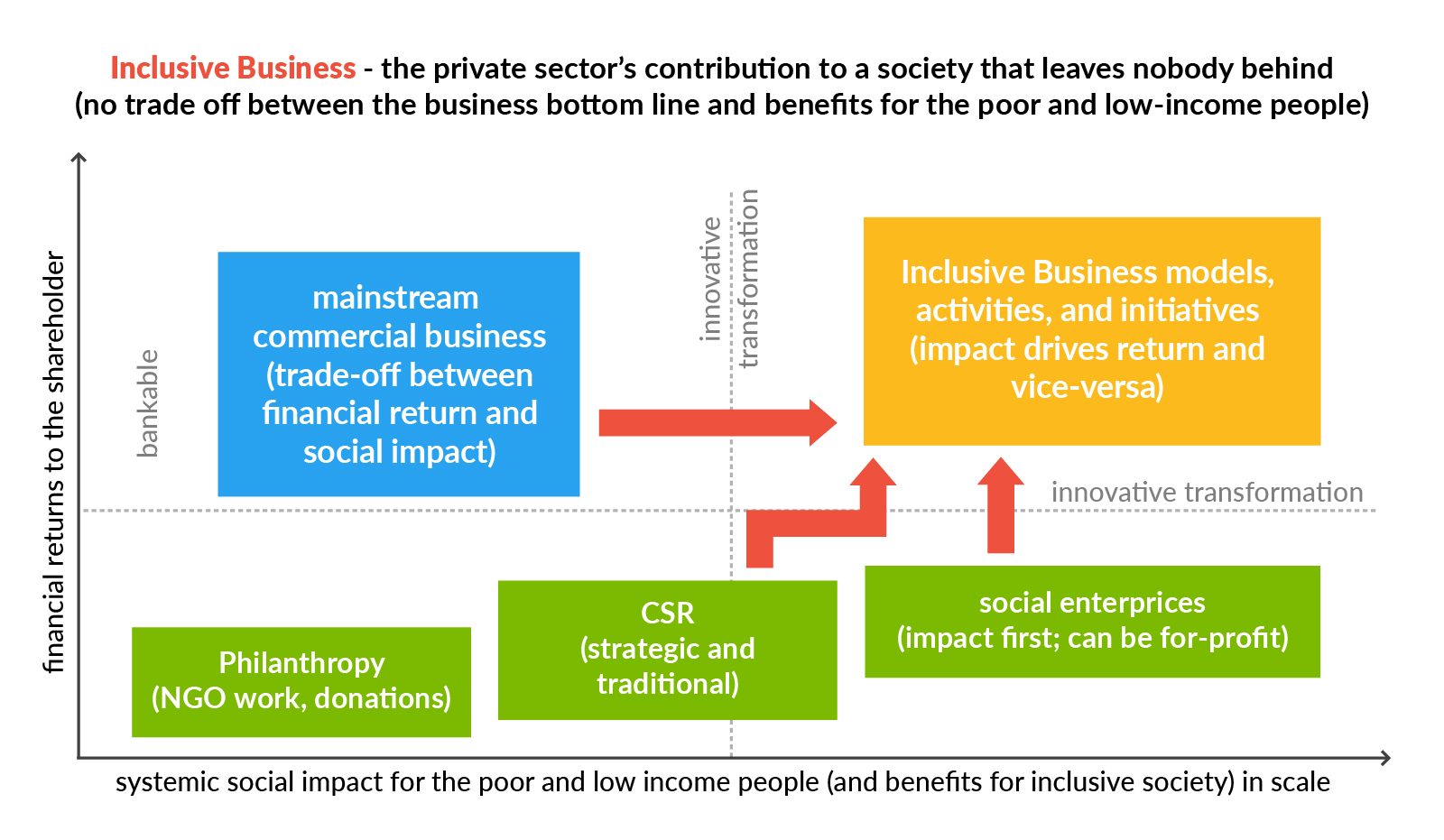Companies with IB business lines are mostly medium sized firms with revenues between $1-$10 million, but also larger corporations and small firms can sponsor IB business lines. According to the G20 IB Framework [1], medium and larger companies often have IB models, while IB activities are core-business work initially financed by corporate social responsibility, while smaller investments ($0.1-$1 million) often done by for-profit social enterprises are called IB initiatives. IB can be found in all sectors, although they are more prevalent in agrobusiness, remote energy provisions, fintech and social insurance, water and housing services, as well as education, health and skills training.
IB companies specifically address the unserved needs of the BoP. While poor and socially excluded people are also found in richer countries, IB is more a concept for emerging economies. This is because, in such countries, mainstream companies typically do not address those large markets with relevant solutions for the poor. In richer economies, IB initiatives and models are typically sponsored by for-profit social enterprises. However, in such countries, multinational companies sometimes turn parts of their foreign direct investments in IB business lines.
IB solutions have high social value for society. They create triple wins for the poor, for the private sector and for the public. Governments are therefore increasingly interested in promoting such companies by establishing special incentives or by targeting their industrial policies towards such companies. Promoting a better enabling IB environment also encourages structural transformation towards higher commercial return and a wider and deeper impact on BoP people. In 2020 the 10 ASEAN countries therefore endorsed a specific IB policy guide[2]. Various countries in the region and in Africa have embarked on specific IB promotion strategies and programs.

Diagram 1: Structural Transformation and triple wins.

IB are deliberately designed to achieve direct social impact for the BoP.
Sometimes a company has different business lines, but only one directly targets the poor. It is then only this IB business line which is important for poverty reduction, not the whole company.
Because IB is part of a core business, and core businesses create a much larger and more sustainable impact than corporate social responsibility.
Mainstream businesses all pay the market rate. But the market rate for the poor is the poverty line. Hence, companies pay the market rate to their suppliers, distributors or employees give jobs but keep them poor.
An IB model is a commercially viable business line with some scale of social impact, typically done by transforming mainstream businesses into an Inclusive business.
An IB initiative is company that transforms from an NGO driven social enterprise to an Inclusive Business, thereby enhancing commercial viability and social impact at the same time.
An IB activity is a company transforming its corporate social responsibility (CSR) work into a core-business.
We know that big projects with big budgets and multistakeholder-levels take time, hence we have a process to support you in doing an Inclusive Business scoping study first. This gives a good understanding of the potential in your market and the next steps required for bigger impact. This is than followed by a landscape study or even going directly from scoping into an Inclusive Business promotion program.
The IBee team would work with government and other stakeholders to come up with a targeted program for IB promotion. Such program often comprises incentives, business coaching, IB accreditation, IB awareness raising, policy and knowledge work, IB impact monitoring, IB financing, and sometimes also regional exchange on IB. On a country-level, the technical assistance work would cost about US$ 3-5 million for a 4-5 years program, financing would be typically costing US$ 20-30 million. Parts of the IBee policy work could be managed under existing programs, thus substantially reducing the costs involved. IB targeting in existing programs is required to calculate what is possible, and where additional resources would be needed. The IBee consultant team can help doing that. Regional approaches could be done faster and at less cost
No, the Inclusive Business process is a generic approach to any company of all sectors and any business size, independent of company ownership and investors nationality. The key conditions for a company to qualify as Inclusive Business is how it creates - under a commercially viable approach - social impact in scale. Further, we see not just local, but regional and even global impact for Inclusive Businesses as trading benefits destination countries or as innovations in one country/continent benefit others in similar situations/markets
[1] G20 (2016) The G20 Inclusive Business Framework.
[2] ASEAN (Sept 2020) The Inclusive Business Policy Guide. (download PDF here)